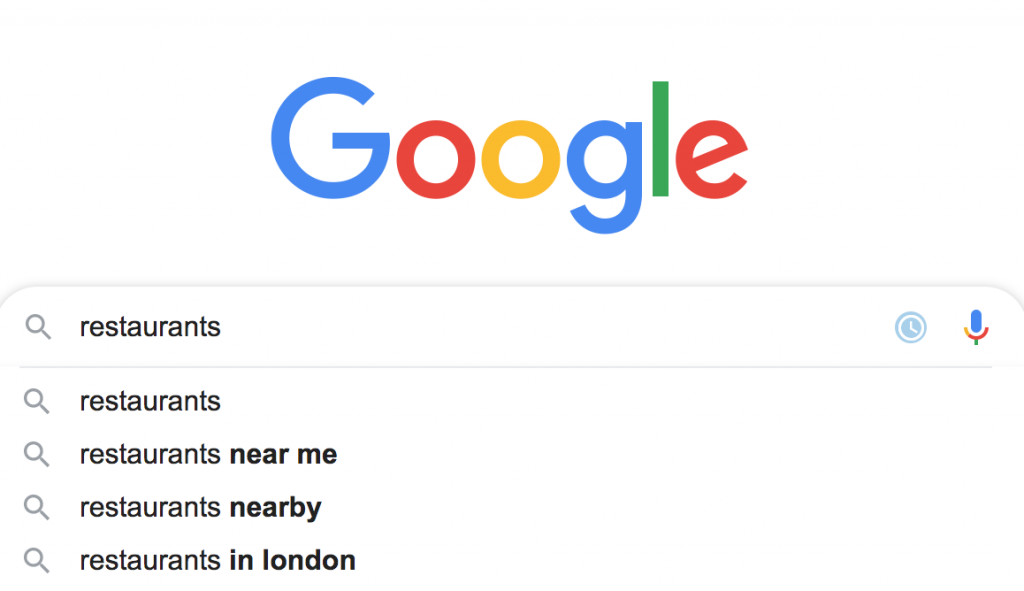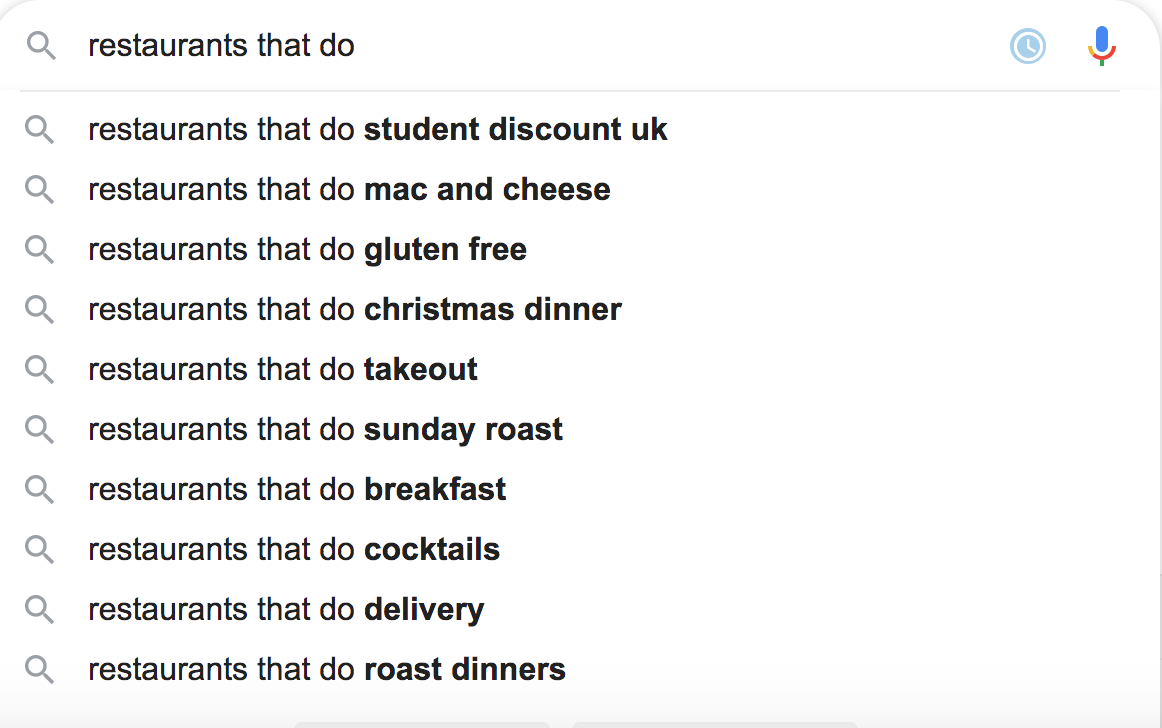Help Google Find Your Local Business | Actionable BERT and E-A-T Algorithm Optimisations | Vélez + Russell
The new BERT update (Google’s newest algorithm search update) is better at anticipating human questions, because this is the major way searches are have transformed since the early days. We are using our smartphones voice search more and more, and that means more question oriented queries and a move away from keyword based searches.
BERT affects 10% of all queries, which is a whole lot, but don’t fret too much. Google’s purpose here stays the same as it has always been. Each successive algorithm rollout is more intuitive and better at guessing a users search intent. That is to say, it attempts to guess what someone is trying to ask in the same way that you try to anticipate what a person asks you whilst having a conversation.
For the purpose of illustrating how Google’s algorithm appreciates certain queries, and how your search engine optimisation strategy can take advantage of the new algorithmic change, we are going to use as an example, a food business.
restaurant seo – example 1
BERT cares about answering questions the human way. The autocomplete feature is more oriented towards everyday, intuitive questions. For business’, this means your location, services and specific, stand out details about you are worth keeping in mind.

You might have a beautiful location and a great menu, but if you are not paying enough attention to your business’ ranking on the search engine results pages for the main engines (Google and co) then you’re unlikely to be attracting the customers you deserve. This is a constant, no matter what the current algorithm is like.
Here’s another example:

From the above search, you should deduce that offering a small student discount and gluten-free options on your menu are likely to help you stand out in this area.
The above example illustrates the advantages of asking yourself questions, checking them with Google’s predictive text and weaving the results into your text when relevant. Not only does this help you to think up colloquialisms, but it also wags its tail at profitable ideas for your business.
Why don’t I show up on Google’s Search Engine Results Pages?
Are you E-A-T-ing?
Some things, Google won’t change: because they work so well. E-A-T stands for expertise, authority and trust. It’s one of the older Google algorithm updates. These older updates aren’t replaced by BERT, instead, successive algorithms stack together like grids, each new addition defining with greater clarity the relevant search results for a search user and allowing different results to have their day- but only if they are more relevant for that user. At least that’s the ideal for these updates.
These updates prevent people from trying to ‘game the system’, with each new update catching out potential flaws and exploitable issues in previous updates.
How to Optimise Your Business for E-A-T
Each new social media account helps to improve your search rankings, especially if you are keeping them updated with regular content. Adding together multiple accounts, and updating them together using an aggregator tool such as Hootsuite is a great way to increase your presence, and boost your possibilities for sales.
Additionally, if you have good reviews, well-known chefs in your field, or sponsorships and certificates that help to show your worth then you’ll definitely want to include those on your business page. Encouraging users who enjoyed your services to leave you a review is a great way to help E-A-T to match new customers with your business.
Specificity and the New BERT Algorithm Update from Google:
As of November 2019, Google searches accounted for over 92% of all global search terms. Bing made up 2.34%, yahoo made up 1.62% and Baidu, Yandex RU, and Duck Duck go made up the remainder. It’s clear that Google and perhaps Bing and Yahoo are the main searchers worth targeting.
Googles algorithm updates will continuously update to feature relevant pages, not necessarily keyword-rich pages or ones that have a lot of backlinks behind them. If you want to rank, focus on great content that answers peoples relevant search queries. Be relevant and specific, and make sure your content is readable.
For instance, instead of ‘People searching for places to eat in North London’ try ‘Where to eat in North London if you want it might be Greek, Thai, Chinese, Turkish, Seafood, Mexican etc. or ‘Where do they do good food near me’.
The implication here is that menus with varieties of food will rank better. However, this is only the first rung on the ladder to achieving a high result. Your reviews, the quality of your dishes, and the age of your restaurant are just a few criteria which factor into your ranking.
Don’t spread yourself too thin: it’s better to cover a few bases well than to list a lot of dishes you cook averagely- the same goes for services of course.
Googles algorithm is also weighted towards the places nearest you, and those places with better reviews. If you can set up a variety of different listings, social media accounts and pages then that’s great. If you’re interested in having a third party take care of the planning and management of these accounts then consider checking out our Accounts Management section.
Bypassing Googles Search Rankings using Google Adwords:
There are ways to beat the search results page listings, which for a new business can be very important. Google Adwords, GumTree are two of the main services I see day-to-day. For restaurants and other hospitality, there is other media toolkits which are worth looking into of course, such as TripAdvisor and OpenTable.
We mainly work with Google AdWords however- given that a huge 92% figure of searches are conducted using it, we think it makes a lot of sense to push your results using its native advertising services. Certain businesses (like ours!) partner up with Google Ads to create tight campaigns that are tailored to suit your business’.
Your business will be pushed to the top of the SERPs for key ranking terms that customers looking for restaurants like yours tend to search and click through on. It’s worth researching these, (or delegating your research to companies such as ours as the software and expertise can make a huge difference) in order to hit the correct keywords and not pay for terms that may get you clicks, but won’t necessarily get you visits or purchases.
Interested in having a third party with a lot of experience take care of the Google Ads side of things? We partner with Google in order to create bespoke campaigns with your demographic in mind. Click here to read more.
HOW DO I KNOW IF THE SEO FOR MY BUSINESS IS WORKING WELL?
As a rule, SEO optimisation takes a little longer to start showing its benefits than PPC. It is very difficult to know immediately if your SEO is working, but after 4-6 months, you should begin noticing positive trends.
If you have hired an SEO to make considerable, site-wide changes then you should expect to see a dip at first, so don’t panic. After a few months, things will recover. The trend can be influenced by numerous factors, notably by new Googles Algorithms updates. A good SEO should stay on top of these changes, although good content is rarely impacted negatively by them.
This change is usually because of a change in keyword rankings, phrases that Google uses to match your content up to the search intent. When phrases are changed in the title and headers, Google may decide to rank someone else for a while instead. Eventually, after the dust settles if your content is up to the new updates standards (it answers the right queries, in a concise way) then you’ll rank better. The idea is to avoid tricks, like spammy backlink building and only rely on quality backlinks, and white-hat SEO strategies- the honest kind, for the uninitiated.
If you want to see for yourself how your SEO work is affecting your business, try using Google Analytics, or another analytics dashboard that shows you trends graphically. Using this free software, you can track all sorts of useful data such as increases in new customers during key business changes, such as a new SEO agent or the start of a pay per click advertisement campaign. If you can notice a positive trend, the chances are it is having an effect.
These metrics can be difficult to configure and interpret, they offer many options for optimising your business website, and learning more about your clients and visitors through incredibly useful features like on-page click sensing, A/B site testing and more. If you’re interested in a package for your company that makes use of such analytics data then check out our SEO package.
HOW CAN I TELL IF MY GOOGLE ADS ARE WORTH IT?
Your PPC advertiser should be providing you with monthly reports on your results, freelancer or not. Without some actionable metrics to prove that your business is getting clicked on and viewed, and hopefully engaged with (for example, following on social channels etc.), the marketer is likely to be taking you for a ride.
You can check that PPC advertisements are working in a number of ways. For smaller restaurants and businesses, using a clicker to tally the number of visitors for a month before, and after the PPC advertising campaign begins is a useful way of keeping track.
With Search Engine Optimisation results can take far longer, up to 3-4 months for the first indication of a trend to be detected. This is why we suggest good pay-per-click advertisement campaigns, especially for a new, growing business. SEO is more cost-effective over the long term when done properly, but a two-pronged approach is always favourable.
TOO LONG: DIDN’T READ?
The reality is that Google’s BERT ranking algorithm will take into account thousands and thousands of different factors, that no SEO will be able to perfectly describe because of their deep complexity. As such we have tried to cover only actionable tips and concepts that are known to have a significant impact on a local business’ ranking.
Most notably, remember that setting up on Google My Business with your address and structuring your content in an easy to understand format is the best way to rank, at least for local searches.
Social media accounts, reviews and having expert authors go a long way too! Any of these by itself will have a negligible impact, so keep building up your reputation, content, reviews and media presence day by day. There’s sadly no short cuts.
…Except for Google pay-per-click Ads, which we will cover in-depth in our coming digital marketing for small business series! Stay tuned 🙂
Citations:
Search statistics are taken from Global Stats Stat Counter



